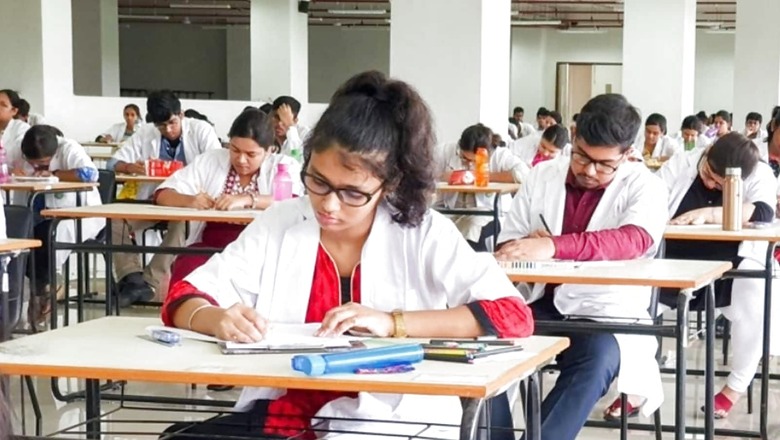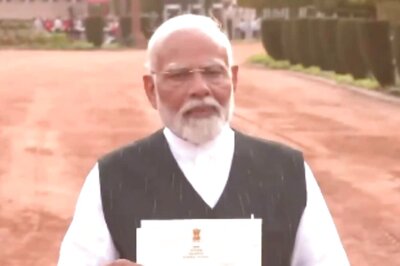
views
On 29 July 2022, the second birth anniversary of the National Education Policy 2020, was celebrated with a great deal of enthusiasm. A few days later, on 7 August 2022 in an important meeting of NITI Aayog’s Governing Council chaired by Prime Minister Narendra Modi, National Education Policy (NEP)-2020 was discussed in depth with regard to its implementation. Fully prepared to meet the challenges of the 21st century, the aims and objectives of NEP-2020 are lofty and far-reaching. But its implementation has been a huge task.
One of the major goals of NEP-2020 is ‘character building’ of students. The very first page of the policy document says: “Education must build character, enable learners to be ethical, rational, compassionate, and caring.” This is reiterated again, on the same page: “This Policy proposes the revision and revamping of all aspects of the education structure…, while building upon India’s traditions and value systems”, so as “to develop all aspects and capabilities of learners; and make education more well-rounded”. In the ‘Principles of the Policy’, it is emphasised further, “The purpose of the education system is to develop good human beings capable of rational thought and action, possessing compassion and empathy, courage and resilience, scientific temper and creative imagination, with sound ethical moorings and values.”
It is not a coincidence that along with the announcement of NEP-2020, the nomenclature ‘Ministry of Human Resource development’ was changed to ‘Ministry of Education’. The term ‘Human Resource’ implied that human beings were resource material, devoid of feelings and values, who could be used and thrown away. It was, in a way, inspired by the materialistic philosophy of the West. On the other hand, the Shiksha (education) designation encompasses, along with the material aspect, all other facets of human character including the cultural and psychological — a reflection of the Indian value system.
Character building and holistic personality development, in fact, have been important goals of Vidya or Shiksha in the Indian thought tradition — the idea being reflected/captured in the oft-repeated Sanskrit shloka “Vidya Dadaati Vinayam”. With over half the population (52 percent) under 30 (National Family Health Survey-5), India is a young country. But the youth of the country are at a crossroads with personality disorders and imbalances afflicting a substantial section. The need for character building and holistic personality development is an urgent requirement of the education system of the current times.
The almost crisis proportions of the situation at hand — best characterised by the dominance of social media with lives shrinking in the shell of technology, the loneliness of the virtual space and the prevalence of indoor gadget games which are fast replacing outdoor sports — have all combined to push the youth down a treacherous path.
We are creating imbalanced individuals, who are proving to be unproductive, burdensome and at times even dangerous, for family, society and the country. One gets to hear abnormal and terrifying stories, almost every day about the youth from across the country.
Considering these needs of youth, Delhi University took the initiative towards the implementation of NEP-2020, and designed ‘Value Addition Courses’ for the undergraduate programme — an innovative and historic step in the university system of the country, with far-reaching consequences.
With the firm belief that education has an important role to play in dealing with the issues mentioned above, the Value Addition Courses (VAC) are a well thought out and far-reaching effort, and are being keenly watched by academics of the entire country. The main objective of these Value Addition Courses (VAC), developed with the help of experts from across the country, is holistic personality development and character building of students; “embedding ethical, cultural and constitutional values; promoting critical thinking, Indian Knowledge Systems, scientific temper, communication, presentation skills and soft skills as well as team work.”
A major hallmark of these VACs, in keeping with the spirit of NEP-2020, is that these will not be purely theoretical courses, as has been propagated by the current Macaulay model. Rather, inspired by ancient Indian pedagogy and Mahatma Gandhi’s model, these courses have at least 50% of the component as hands-on learning or practical. The practical section will range from fieldwork, surveys, projects to other experiential learning and applied aspects. Importantly, the 50% practical based study will not be limited to science-oriented courses but also in courses inclined towards humanities, social sciences or commerce, providing hands-on experience to these students.
Another notable feature of VAC is that instead of pure laboratory-based practicals, the experiments and applied activities will be conducted in the ‘laboratory of life’, connecting the students with society and with the country at large. For example, the course entitled ‘Swachh Bharat’, inspired by Swachh Bharat Abhiyan of Prime Minister Narendra Modi, is not just limited to theoretical understanding of cleanliness and hygiene, related social policy and programmes, relationship between sanitation and development, or waste management techniques etc, it also has various Practical/ Practice Components like Conducting a ‘Cleanliness Audit’, Swachh Bharat Internship, Organise Swachhata Pakhwada with the help of community. This, on the one hand, will inculcate a sense of social responsibility and a sense of service in our youth, and on the other hand, a sense of patriotism will also develop in them.
Another feature of VAC is that irrespective of the streams, any student, whether from the sciences, humanities, social sciences or commerce, etc, can opt for them. This will promote multi-disciplinarity while enriching the diversity of the class, a need of the hour in current times. In addition, unlike some ‘add on’ short-term courses, offered at some places, these VAC will be credit courses, and marks obtained will be part of the grade sheet, thus, engendering seriousness into their study.
So far 24 courses have been prepared for the first semester of the upcoming academic session 2022-23. A total of about 100 such will be developed for the entire undergraduate programme. Some of the current courses include: ‘Vedic Mathematics’, ‘Swachh Bharat’, ‘Fit India’, ‘Art of Being Happy’, ‘Emotional Intelligence’, ‘Panchkosh: Holistic Development of Personality’, ‘Indian Bhakti Tradition and Human Values’, ‘Ayurveda and Nutrition’, ‘Science and Society’, ‘Yoga: Philosophy and Practices’, ‘Sahitya, Sanskriti and Cinema’, ‘Ethics and Values in Ancient Indian Tradition’, ‘Constitutional Values and Fundamental Duties’, ‘Sports for Life’, ‘Digital Empowerment’, etc. A unique attribute of the VACs is that elements of the rich Indian knowledge system (IKS) have been duly incorporated, as specified in the NEP-2020.
For example, ‘Vedic Mathematics’ is a unique course of its kind, which will be taught as a credit course in a prestigious university like DU in the country. PM Modi has talked about ‘Vedic Mathematics’ in many of his speeches. It was our misfortune that we couldn’t include this rich heritage of mathematics in our courses even after Independence. ‘Vedic Mathematics’ increases manifold the computational ability of students. Such skills are extremely useful in competitive exams like the ‘CAT’ for admission in IIMs and other institutes. Additionally, Vedic Mathematics will also promote critical thinking among students. Besides, this will instil a sense of pride and reverence for India.
One often sees young people, a product of the current education system, showing a scorn towards the ancient Indian knowledge tradition. Similarly, ‘Panchkosh: Holistic Development of Personality’ will prove helpful in dealing with the increasing personality imbalance, mental stress and aggressive behaviour among the youth today. Moulding the personality and character on the basis of ‘Panchkosh’ delineated in Taittiriya Upanishad will give a positive direction to the youth. The course ‘Yoga: Philosophy and Practice’ will also be very useful given the complex and stressful life today. To apprise students with the great heritage of IKS, 25 percent of the total courses are from subject areas related to IKS.
Apart from that, other courses also incorporate elements of IKS wherever necessary. For example, in the course ‘Constitutional Values and Fundamental Duties’, along with ‘Secularism’, the concept of ‘Sarva Dharma Sambhav’ has also been added. It must be specified here that our constitutional position with regard to religion is more in line with the Indian concept of ‘Sarva Dharma Sambhav’ than the concept of ‘Secularism’.
With its economic strides, the ‘New India’ of our youth is in high gear to take the world by storm, in the 21st century. But it would be expedient that this ‘New India’ is also balanced, has character, is socially responsible with a sense of patriotism. Only then can India become a Jagadguru again. Delhi University’s ‘Value Addition Courses’ will be a quintessential model in this regard for the universities of the country.
Prof Niranjan Kumar is the Chairman of the ‘Value Addition Courses’ Committee and Dean, Planning at Delhi University. He has taught earlier in various American universities. He tweets @NiranjanKIndia. Views expressed are personal.
Read the Latest News and Breaking News here




















Comments
0 comment